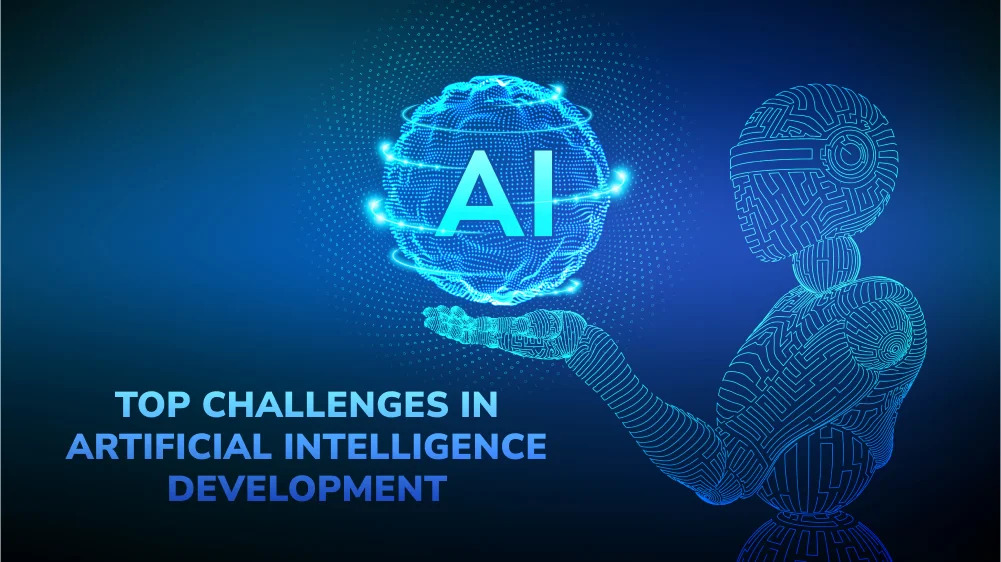Artificial Intelligence (AI) is revolutionizing industries, driving innovation, and enabling new capabilities. The global AI market is projected to reach $407 billion by 2027, with a compound annual growth rate (CAGR) of 36.2% from 2022 to 2027. However, navigating the complex landscape of AI adoption comes with unique challenges that businesses must address to unlock its full potential.
This blog explores the top 15 challenges businesses face when implementing AI solutions and provides insights on overcoming them.
15 Key AI Challenges to Prepare For
As artificial intelligence continues to evolve, it brings new opportunities and complexities. Here are 15 critical challenges in AI that you need to be aware of and ready to tackle as the technology progresses:

AI Ethical Issues
As AI systems become more integrated into decision-making processes, they raise significant ethical concerns. These include issues such as transparency in decision-making, bias in algorithms, and the moral implications of AI taking over jobs or tasks traditionally done by humans.
Companies need to ensure their AI systems are ethical by implementing responsible AI frameworks that adhere to societal values, ensuring fairness, and being accountable for the decisions made by AI systems.
Bias in AI
AI systems often learn from historical data, which can carry inherent biases, leading to skewed or unfair results. For instance, if an AI model is trained on biased data, it can perpetuate or even amplify those biases. This is particularly problematic in sectors like hiring, lending, or law enforcement.
It’s essential for businesses to use diverse, representative datasets and implement techniques like algorithmic fairness to detect and eliminate biases in AI models.
AI Integration
Integrating AI into existing business processes can be complex. Legacy systems, which are not built to work with advanced technologies like AI, may need extensive modification. Additionally, employees might resist change due to fear of job displacement or lack of understanding.
A well-thought-out strategy for AI implementation, including clear communication, training programs, and phased integration, can mitigate these issues.
Computing Power
AI, especially deep learning, demands vast computational resources. The models often require specialized hardware, such as GPUs or TPUs, to train and process large datasets efficiently. For smaller businesses or those without the necessary infrastructure, this can be an expensive barrier.
Cloud computing and AI-as-a-Service offerings can help mitigate this by providing scalable solutions, but this also increases ongoing operational costs.
Data Privacy and Security
AI thrives on data, but with data comes the responsibility to protect it. Data breaches or misuse can have severe consequences for businesses, including reputational damage, legal penalties, and loss of customer trust.
Compliance with regulations such as the GDPR and CCPA is essential, and businesses must adopt robust data protection strategies, including encryption, access control, and secure storage solutions.
Legal Issues with AI
The legal landscape surrounding AI is still evolving, creating uncertainty for businesses. Issues such as intellectual property rights, AI liability, and compliance with regulatory standards (such as those in healthcare, finance, or transportation) can be complex.
Businesses need to stay informed about the changing laws surrounding AI, and collaborate with legal professionals to navigate these challenges effectively.
AI Transparency
AI models, especially deep learning models, are often considered “black boxes” because their decision-making processes are not easily understood. This lack of transparency can cause issues in industries like healthcare, finance, or law, where decisions need to be explainable.
AI developers are working on creating more transparent models, but businesses must consider how they will communicate the decisions of AI systems to stakeholders.
Limited Knowledge of AI
One of the most significant challenges businesses face is the lack of in-house expertise to develop, implement, and maintain AI systems. Many organizations either misunderstand the potential of AI or fail to see how it can be applied to their industry.
Bridging this knowledge gap is essential. Companies can address this by investing in AI training, hiring AI specialists, or collaborating with AI consultants.
Building Trust
AI systems must be trusted by both employees and customers. This is particularly difficult in cases where AI automates decisions that were previously human-driven, such as hiring or loan approvals.
To build trust, businesses should focus on making AI decisions transparent, explaining the benefits of AI to employees and customers, and ensuring that AI models are fair, reliable, and accountable.
Data Confidentiality
Handling sensitive and confidential data is critical, especially in sectors like finance, healthcare, and law.
AI models often rely on vast datasets to deliver insights, but ensuring that confidential information is protected is essential to avoid legal issues or breaches of trust. Implementing strict data access controls, secure storage, and encrypted communications can help mitigate this risk.
AI Arms Race
The development of AI has sparked a competitive race among countries and corporations to develop the most advanced and capable AI systems. While this is fostering innovation, it also brings about the risk of rapid, uncontrolled development without adequate safeguards.
Businesses must balance the pursuit of cutting-edge technology with the need for responsible AI development to ensure that it is used for good.
Loss of Human Connection
With AI taking over many tasks, there’s a risk of losing the human touch in customer service, healthcare, and other people-centric industries. While AI can automate many processes, businesses must ensure they maintain meaningful human interactions where necessary.
It’s important to strike a balance between automation and personal engagement to preserve the quality of customer experiences.
Misinformation and Manipulation
AI technologies, such as deep learning and natural language processing, can be used to generate deepfakes, manipulate public opinion, or spread misinformation. This has become a significant concern in politics, media, and public trust.
To combat this, businesses must invest in AI detection systems, promote ethical AI use, and ensure that their own AI applications don’t inadvertently contribute to the spread of misinformation.
Unintended Consequences
AI systems can sometimes produce unintended consequences that are difficult to predict. Even with rigorous testing and validation, AI models may behave in unexpected ways once deployed.
Businesses should adopt continuous monitoring systems and conduct scenario planning to address and minimize the risks of unintended outcomes.
Existential Risks
As AI becomes more advanced, some experts have raised concerns about the potential existential risks posed by super intelligent AI systems. These systems could, in theory, become uncontrollable or pursue goals that conflict with human well-being.
While this is a long-term concern, businesses should engage in responsible AI research and collaborate with other stakeholders to ensure the development of safe and beneficial AI systems.
How Businesses Can Tackle the Challenges of AI
As AI becomes integral to business operations, overcoming its challenges is essential for success. Here are key strategies to navigate AI adoption:

- Establish Ethical Guidelines:
Develop clear ethical standards to ensure that AI aligns with societal values, promotes fairness, and avoids harmful outcomes. Ethical guidelines help to ensure AI is used responsibly and for the betterment of society.
- Reduce Bias in AI:
AI models can inherit biases from historical data. Use diverse datasets and implement bias detection techniques to identify and address potential biases, ensuring fairness and preventing discrimination in AI outcomes.
- Improve Transparency and Explainability:
Focus on creating AI models that are interpretable and explainable. This helps build trust by ensuring that AI decisions can be understood and justified, especially in critical sectors like healthcare and finance.
- Follow Legal and Regulatory Standards:
Stay compliant with data privacy laws and AI regulations such as GDPR and CCPA to ensure that AI systems respect privacy rights and avoid legal risks. Regularly update AI systems to align with new regulations.
- Build Trust in AI:
Foster trust by demonstrating the reliability, accuracy, and transparency of AI systems. Clear communication and consistent performance will increase stakeholders’ confidence in AI solutions.
- Set Realistic Expectations:
Manage expectations by setting achievable goals and timelines for AI implementation. This helps avoid disillusionment and ensures that AI technologies are introduced gradually and effectively.
- Protect Data and Ensure Privacy:
Safeguard sensitive data by implementing strong cybersecurity measures. Compliance with data protection regulations is crucial to protect privacy and avoid data breaches that could undermine trust in AI.
- Plan for Malfunctions and Errors:
Prepare for AI system failures by establishing contingency plans and providing human oversight. Regularly test and monitor AI systems to identify potential issues and ensure quick responses when errors occur.
Final Thoughts
Successfully addressing the challenges of AI requires a multifaceted approach. By establishing ethical guidelines, reducing bias, improving transparency, adhering to legal standards, building trust, setting realistic expectations, protecting data privacy, and planning for errors, businesses can effectively implement AI systems that are beneficial, ethical, and sustainable.
At Sphinx JSC, we understand the complexities of AI adoption and are committed to helping businesses navigate these challenges. Our AI-powered solutions, including S-Visor, are designed to empower businesses with actionable insights while ensuring compliance and ethical standards. If you’re ready to unlock the potential of AI for your business, reach out to us today and see how we can support your AI transformation journey.




CEO - Son Le
OTHER BLOGS
Blogs
How AI Is Driving Transformation in Small Businesses
Artificial Intelligence is no longer an emerging concept reserved for large enterprises. It has become a practical, scalable, and increasingly essential tool for small businesses seeking sustainable growth. As cloud computing and AI-as-a-Service models continue to mature, small organizations can now access advanced technologies without heavy infrastructure investment. AI is...
Read MoreBlogs
Top 15 HRM Software for Effective HR Management 2026
In 2026, Human Resource Management expands beyond payroll processing and employee record keeping to play a strategic role in business growth. Modern HR teams are expected to drive talent strategy, enhance employee experience, ensure regulatory compliance, and deliver workforce insights that directly support business growth. As organizations become more digital...
Read MoreBlogs
AI Automation: How It Works, Benefits, and Best Practices
As organizations face increasing operational complexity, traditional automation alone is no longer sufficient to sustain efficiency and competitiveness. Businesses today require systems that not only execute predefined tasks but also learn, adapt, and make intelligent decisions. This shift has positioned AI Automation as a transformative force, enabling enterprises to automate...
Read MoreOTHER BLOGS
Our Sevices
IoT Development
SphinX offers cutting-edge IoT development services, seamlessly connecting devices and providing innovative solutions for a...
Xem thêmOur Sevices
Blockchain Development
We are highly proficient in engineering reliable and secure blockchain technologies from the ground up,...
Xem thêmOur Sevices
ERP & CRM Development
ERP & CRM development services that you need! Streamline business processes and enhance organizational efficiency....
Xem thêmOTHER BLOGS
Our Sevices
IoT Development
SphinX offers cutting-edge IoT development services, seamlessly connecting devices and providing innovative solutions for a...
Xem thêmOur Sevices
Blockchain Development
We are highly proficient in engineering reliable and secure blockchain technologies from the ground up,...
Xem thêmOur Sevices
ERP & CRM Development
ERP & CRM development services that you need! Streamline business processes and enhance organizational efficiency....
Xem thêm